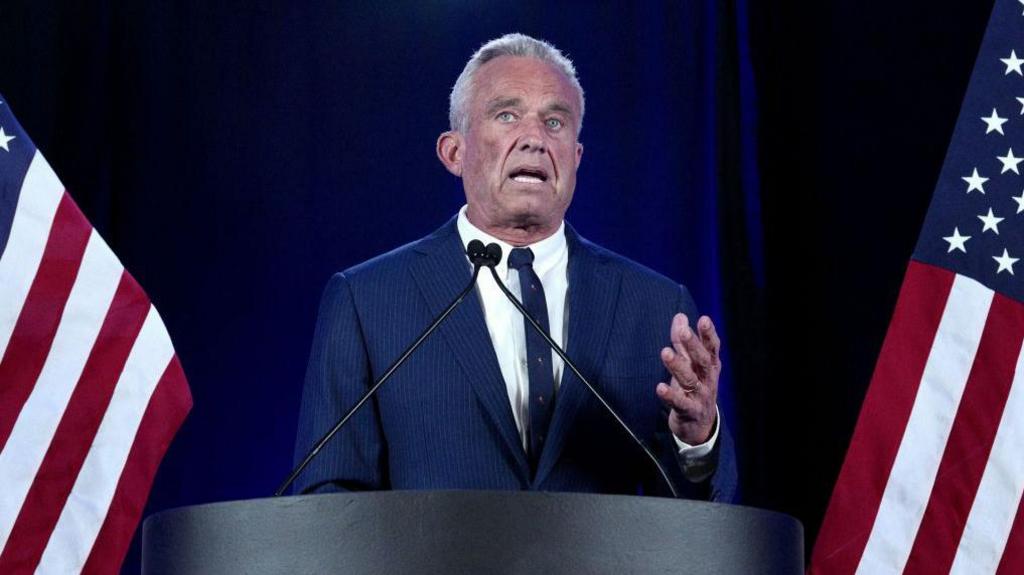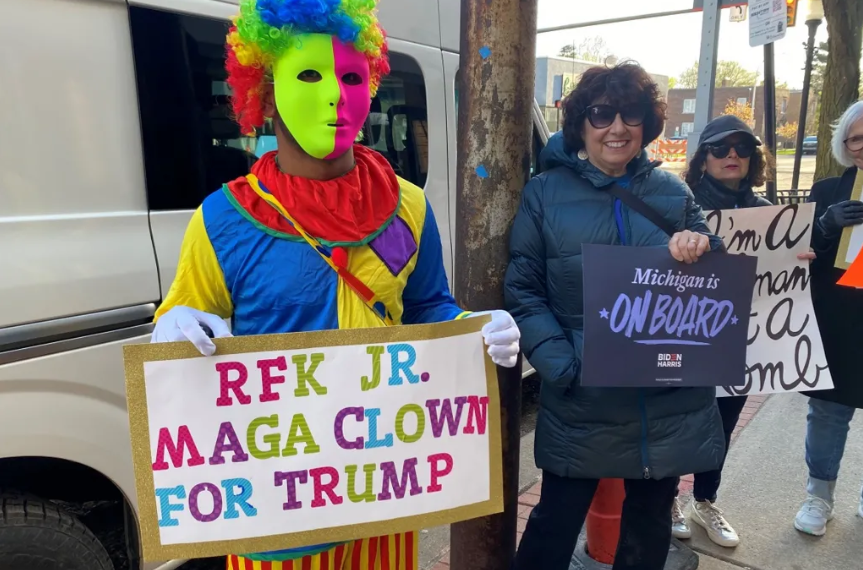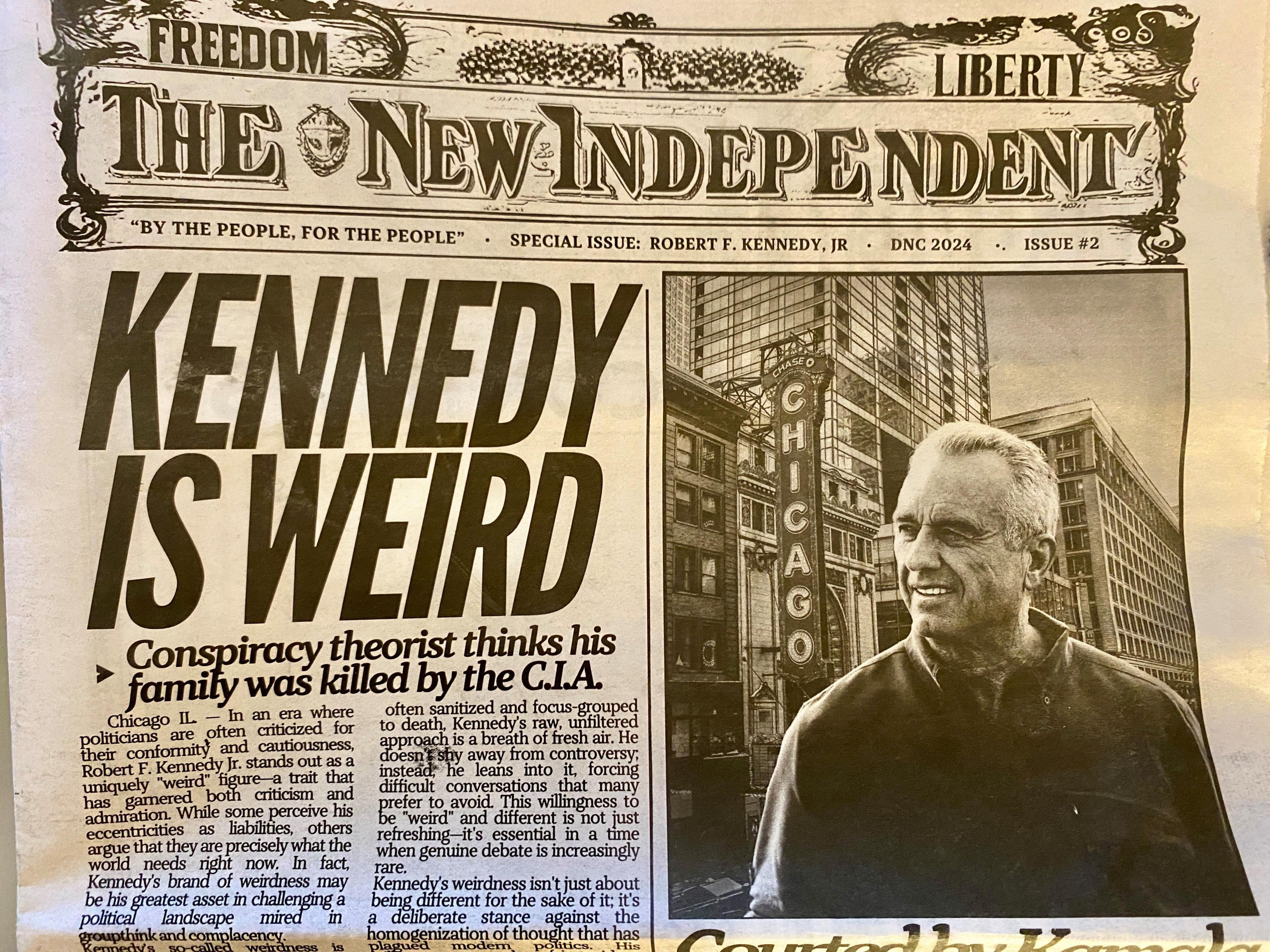RFK Jr just endorsed Trump. Will it matter in November?

Mr Kennedy announcing the suspension of his campaign in a speech in Arizona
- Published
The independent campaign of Robert F Kennedy Jr is over, but the question that has followed him on the campaign trail remains – does his support come mostly from those who would otherwise vote Republican or Democrat?
His base was small and shrinking. An average of opinion polls by the website RealClearPolitics puts him on 5%, down from the high teens just a few months ago.
But in a closely fought election, Kennedy voters could swing victory either way for Donald Trump or Kamala Harris in November's election.
Much of the slump in Mr Kennedy's numbers, experts say, is down to excitement among Democrats over their new candidate, Vice-President Harris.
“When it was Biden versus Trump people were looking for a third option,” said Merrill Matthews, a resident scholar with the conservative Institute for Policy Innovation who has studied the history of third-party campaigns.
“But with Kamala Harris coming into the picture and gaining the Democratic nomination, that has changed.”
Opinion polls that reflect independent and third-party candidates – including the Green Party’s Jill Stein and left-wing activist Cornel West – have been inconclusive about where Mr Kennedy’s support is coming from.
In some cases they show his presence in the race benefiting Republicans; in others Democrats; and in nearly every such poll, the margins are slim.
Foo Fighters and fireworks: Trump introduces RFK at rally
But observers believe that a significant chunk of Mr Kennedy’s liberal-leaning support may have already been drawn back to the Democratic party by Ms Harris’s rise.
Mr Matthews said the suspension of RFK Jr’s campaign means Trump will get a “little bit of a bounce”.
“But I’m not sure it will be very much, as Kennedy was dropping pretty significantly in the polls,” he said.
Still, a few votes in battleground states might be enough to swing an election that appears very close at the moment. Mr Kennedy is keenly aware of this, announcing on Friday that he would only be deleting his name from the ballot in swing states where he believes his presence would hurt Trump’s campaign.
Although he’s a member of the country’s most famous Democratic family, Mr Kennedy spent most of his drop-out speech criticising the party. He also spent much of his campaign butting heads with the Democratic establishment.
At a fundraiser this spring in suburban Detroit – a key battleground in the crucial swing state of Michigan – protesters from the local Democratic party stood outside holding signs calling him a spoiler.

Democratic protesters in Michigan - before President Biden dropped out of the race
His decision to throw his support behind Trump will vindicate those allegations in the minds of Kennedy critics.
“I think some of his voters will vote for Trump, and there are others who won’t be satisfied with either candidate and who just won’t vote,” said Melissa Smith, author of Third Parties, Outsiders, and Renegades: Modern Challenges to the Two-Party System in Presidential Elections.
But Mr Kennedy’s campaign, struggling for cash, might have had more impact on the race if he had stayed in, or dropped out at the last minute.
With more than two months to go until election day, Ms Smith predicted that his run would be a “blip in history”, which could quickly become old news in an election contest that has already thrown up lots of surprises.
For now, however, Trump appears better placed to capture more of what’s left of Mr Kennedy’s support.
The Trump campaign released a memo from its pollster Tony Fabrizio, stating that Republicans stand to gain.
“This is good news for President Trump and his campaign – plain and simple,” he wrote.
But his endorsement also poses some risk for Trump, as Democrats seek to define the Republican ticket as “weird” – by which they mean outside the mainstream of American politics.
Mr Kennedy, with his fringe anti-vaccination views, could end up providing more material for such attacks.
Outside this week’s Democratic National Convention, a tongue-in-cheek newspaper stating that it was funded by his campaign boasted the headline “Kennedy is weird”.
Chock-full of anti-vaccine messages and references to conspiracy theories, its underlying message was that “weird” is good.
The Harris campaign, meanwhile, did not directly refer to RFK Jr in a statement responding to the news on Friday.
“For any American out there who is tired of Donald Trump looking for a new way forward, ours is a campaign for you,” said Harris campaign chair Jen O’Malley Dillon.

A satirical newspaper paid for by the Kennedy campaign argued that Mr Kennedy's brand of 'weird' is 'refreshing' and 'essential in a time when genuine debate is increasingly rare'